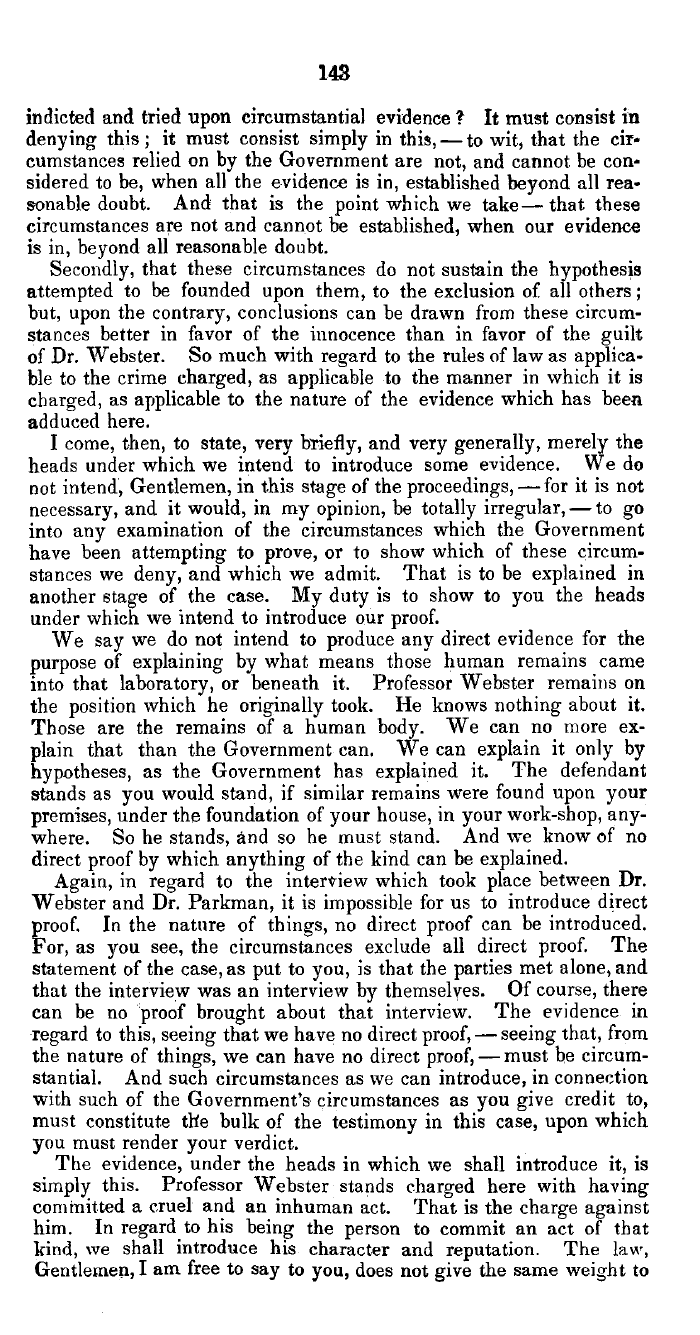|
1!43
indicted and tried upon circumstantial evidence ? It must consist in
denying this; it must consist simply in this,-to wit, that the cir-
cumstances relied on by the Government are not, and cannot be con-
sidered to be, when all the evidence is in, established beyond all rea-
sonable doubt. And that is the point which we take- that these
circumstances are not and cannot be established, when our evidence
is in, beyond all reasonable doubt.
Secondly, that these circumstances do not sustain the hypothesis
attempted to be founded upon them, to the exclusion of all others;
but, upon the contrary, conclusions can be drawn from these circum-
stances better in favor of the innocence than in favor of the guilt
of Dr. Webster. So much with regard to the rules of law as applica-
ble to the crime charged, as applicable to the manner in which it is
charged, as applicable to the nature of the evidence which has been
adduced here.
I come, then, to state, very briefly, and very generally, merely the
heads under which we intend to introduce some evidence. We do
not intend, Gentlemen, in this stage of the proceedings,-for it is not
necessary, and it would, in my opinion, be totally irregular,-to go
into any examination of the circumstances which the Government
have been attempting to prove, or to show which of these circum-
stances we deny, and which we admit. That is to be explained in
another stage of the case. My duty is to show to you the heads
under which we intend to introduce our proof.
We say we do not intend to produce any direct evidence for the
purpose of explaining by what means those human remains came
into that laboratory, or beneath it. Professor Webster remains on
the position which he originally took. He knows nothing about it.
Those are the remains of a human body. We can no more ex-
plain that than the Government can. We can explain it only by
hypotheses, as the Government has explained it. The defendant
stands as you would stand, if similar remains were found upon your
premises, under the foundation of your house, in your work-shop, any-
where. So he stands, And so he must stand. And we know of no
direct proof by which anything of the kind can be explained.
Again, in regard to the interview which took place between Dr.
Webster and Dr. Parkman, it is impossible for us to introduce direct
Vroof. In the nature of things, no direct proof can be introduced.
or, as you see, the circumstances exclude all direct proof. The
statement of the case, as put to you, is that the parties met alone, and
that the interview was an interview by themselves. Of course, there
can be no 'proof brought about that interview. The evidence in
regard to this, seeing that we have no direct proof,-seeing that, from
the nature of things, we can have no direct proof,-must be circum-
stantial. And such circumstances as we can introduce, in connection
with such of the Government's circumstances as you give credit to,
must constitute the bulk of the testimony in this case, upon which
you must render your verdict.
The evidence, under the heads in which we shall introduce it, is
simply this. Professor Webster stands charged here with having
committed a cruel and an inhuman act. That is the charge against
him. In regard to his being the person to commit an act of that
kind, we shall introduce his character and reputation. The laN•,
Gentlemen, I am free to say to you, does not give the same weight to
|

